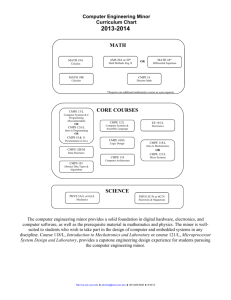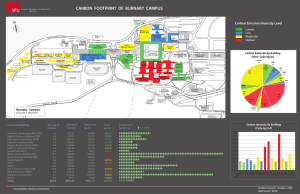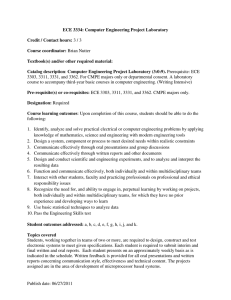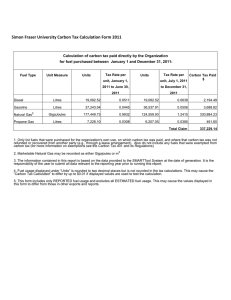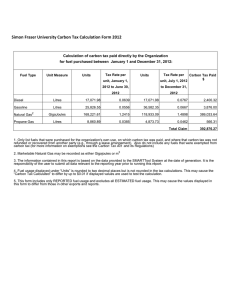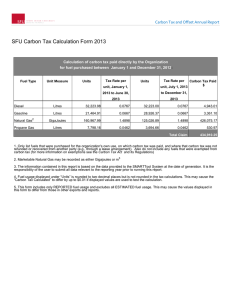KGCOE
advertisement
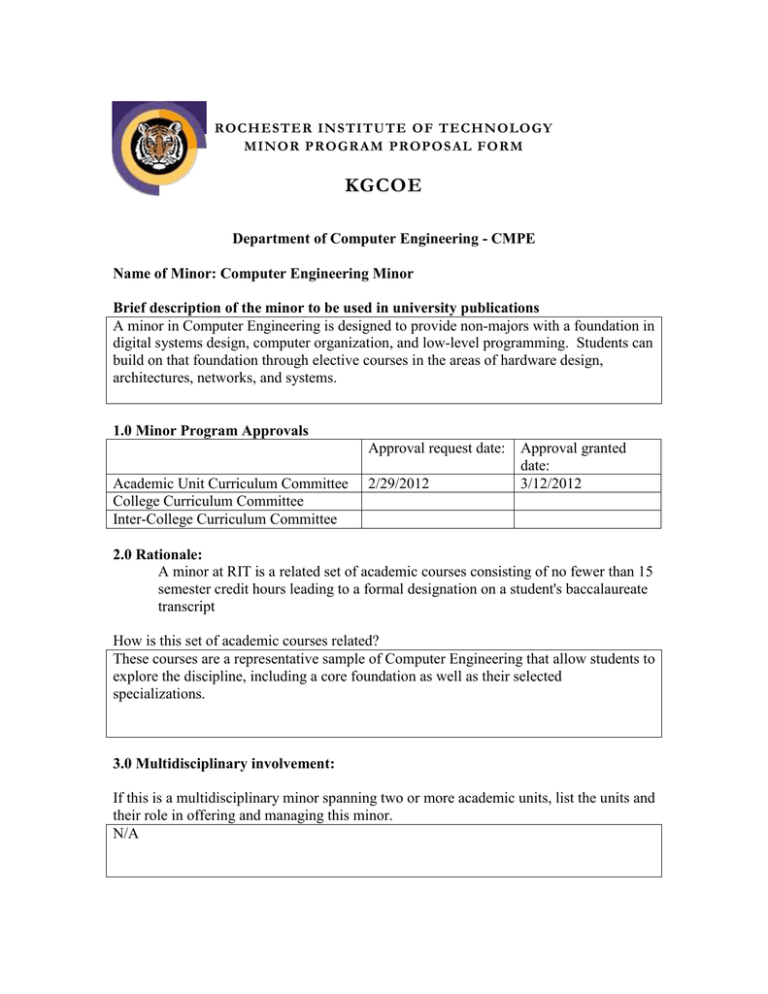
ROCHESTER INSTITUTE OF TECHNOLOGY MINOR PROGRAM PROPOS AL FORM KGCOE Department of Computer Engineering - CMPE Name of Minor: Computer Engineering Minor Brief description of the minor to be used in university publications A minor in Computer Engineering is designed to provide non-majors with a foundation in digital systems design, computer organization, and low-level programming. Students can build on that foundation through elective courses in the areas of hardware design, architectures, networks, and systems. 1.0 Minor Program Approvals Approval request date: Academic Unit Curriculum Committee College Curriculum Committee Inter-College Curriculum Committee 2/29/2012 Approval granted date: 3/12/2012 2.0 Rationale: A minor at RIT is a related set of academic courses consisting of no fewer than 15 semester credit hours leading to a formal designation on a student's baccalaureate transcript How is this set of academic courses related? These courses are a representative sample of Computer Engineering that allow students to explore the discipline, including a core foundation as well as their selected specializations. 3.0 Multidisciplinary involvement: If this is a multidisciplinary minor spanning two or more academic units, list the units and their role in offering and managing this minor. N/A 4.0 Students ineligible to pursue this minor: The purpose of the minor is both to broaden a student's college education and deepen it in an area outside the student’s major program. A minor may be related to and complement a student’s major, or it may be in a completely different academic/professional area. It is the responsibility of the academic unit proposing a minor and the unit’s curriculum committee to indicate any home programs for which the minor is not a broadening experience. Please list below any home programs whose students will not be allowed to pursue this minor, provide the reasoning, and indicate if this exclusion has been discussed with the affected programs: KGCOE CMPE (already part of major program) CAST CPET (Electrical, Computer and Telecommunications Engineering Technology) (repeats rather than broadens students’ educational experience) 5.0 Minor Program Structure, Sequence and Course Offering Schedule: Describe the structure of the proposed minor and list all courses, their anticipated offering schedule, and any prerequisites. All minors must contain at least fifteen semester credit hours; Minors may be discipline-based or interdisciplinary; In most cases, minors shall consist of a minimum of two upper division courses (300 or above) to provide reasonable breadth and depth within the minor; As per New York State requirements, courses within the minor must be offered with sufficient frequency to allow students to complete the minor within the same time frame allowed for the completion of the baccalaureate degree; Provide a program mask showing how students will complete the minor. Narrative of Minor Program Structure: I. Policies A minor in Computer Engineering is open to all undergraduate students matriculated at RIT with exceptions listed in 4.0 above. Student must complete at least 15 semester credit hours of approved Computer Engineering courses to earn a minor in Computer Engineering. At least 9 of the 15 semester credit hours must be Computer Engineering courses not required by a student’s home program. Posting of the minor on a student's transcript requires passing the minor courses with a minimum grade point average of 2.0 in the minor courses. A minor may not be added after the granting of the bachelor's degree. II. Course Requirements 1. Prerequisites: Students entering the Computer Engineering Minor should have the following prerequisites. 2 Mathematical capability at the level of MATH 181 Project-Based Calculus I, MATH 172 Calculus B, or MATH 190 Discrete Mathematics for Computing. Programming capability at the level of CSCI 141 Computer Science I. 2. Core Courses: All students must complete the following three core courses: CMPE 160 Digital System Design I, CMPE 250 Assembly Language Programming, and CMPE 350 Computer Organization. Exceptions: Core course waiver: Students that have taken a course outside Computer Engineering that has significant overlap with one of the above core courses may request Computer Engineering Department approval for waiving that course requirement. For example, CMPE 160 can be waived for students with EEEE 120 credit. Core course substitution: Students that have taken a course outside Computer Engineering that has substantial overlap with a core course may request Computer Engineering department approval for the substitution of that core course with a Computer Engineering elective course. 3. Elective Courses: All students must complete at least two approved Computer Engineering courses outside the core. Required and elective (optional) courses for CE minor with the required prerequisites are shown in the following Table. Course Number & Title SCH Requir ed Optional Fall CMPE 160 Digital System Design I CMPE 250 Assembly Language 3 YES x 4 YES CMPE 350 Computer Organization 3 YES CMPE 260 Digital System Design II 4 YES Spri ng Prerequisites x Annual /Bienni al Annual x x Annual x x Annual x x Annual CMPE-160 Digital System Design I, programming skills at CSCI-141 Computer Science I level CMPE-160 Digital Systems Design I, CMPE-250 Assembly Language Programming CMPE-160 Digital System Design I, programming skills at CSCI-141 Computer Science I level 3 CMPE 380 Applied Programming 3 YES x x Annual CMPE 460 Interface & Digital Electronics CMPE 480 Digital Signal Processing 4 YES x x Annual 3 YES x x Annual CMPE 530 Digital IC Design 3 YES x x Annual CMPE 551 Computer Architecture CMPE 553 Control Systems 3 YES x x Annual 3 YES x CMPE 570 Data and Communication Networks CMPE 651 High Performance Architectures CMPE 660 Reconfigurable Computing CMPE 663 Real Time & Embedded Systems 3 YES x 3 YES 3 YES 3 YES CMPE 684 Wireless Networks CMPE 730 Advanced Digital IC Design CMPE 756 Multiple Processor Systems 3 YES x Annual 3 YES x Annual 3 YES x Annual Annual MATH-231 Differential Equations, MATH -241 Linear Algebra, programming skills at CSCI-141 Computer Science I level EEEE-381 Electronics I, CMPE-250 Assembly Language CMPE-380 Applied Programming, MATH-231 Differential Equations, MATH -241 Linear Algebra CMPE-260 Digital System Design II and EEEE-381 Electronics I CMPE-350 Computer Organization MATH-231 Differential Equations, CMPE-480 Digital Signal Processing MATH-251 Probability & Statistics I x Annual x Annual CMPE-551 Computer Architecture x Annual x Annual CMPE-260 Digital System Design II, CMPE-350 Computer Organization CMPE-380 Applied Programming or SWEN461 Mathematical Models of Software CMPE-570 Data and Communications Networks CMPE-530 Digital Integrated Circuit Design CMPE-551 Computer Architecture Total credit hours: 16 4 Two Typical Program Masks: Second/Third Year CMPE 160 CMPE 250 Digital Assembly System Language Design I (3) (4) Total Credit Hours: 16 Fourth Year CMPE 350 CMPE 551 Computer Computer Organization Architecture (3) (3) Fifth Year CMPE 663 Real Time & Embedded Systems (3) Second/Third Year CMPE 160 CMPE 250 Digital Assembly System Language Design I (3) (4) Fourth Year CMPE 350 CMPE 380 Computer Applied Organization Programming (3) (3) Fifth Year CMPE 460 Interface & Digital Electronics (4) Total Credit Hours: 17 5 Policy Name: D1.1 MINORS POLICY 1. Definition A minor at RIT is a related set of academic courses consisting of no fewer than 15 semester credit hours leading to a formal designation on a student's baccalaureate transcript. The purpose of the minor is both to broaden a student's college education and deepen it in an area outside the student’s major program. A minor may be related to and complement a student’s major, or it may be in a completely different academic/professional area. It is the responsibility of the academic unit proposing a minor and the unit’s curriculum committee to indicate any home programs for which the minor is not a broadening experience. In most cases, minors shall consist of a minimum of two upper division courses to provide reasonable breadth and depth within the minor. 2. Institutional parameters a) Minors may be discipline-based or interdisciplinary; b) Only matriculated students may enroll in a minor; c) At least nine semester credit hours of the minor must consist of courses not required by the student's home program; d) Students may pursue multiple minors. A minimum of nine semester credit hours must be designated towards each minor; these courses may not be counted towards other minors; e) The residency requirement for a minor is a minimum of nine semester credit hours consisting of RIT courses (excluding "X" graded courses); f) Posting of the minor on the student's academic transcript requires a minimum GPA of 2.0 in each of the minor courses; g) Minors may not be added to the student's academic record after the granting of the bachelor's degree. 6 3. Development/approval/administration processes a. Minors may be developed by faculty at the departmental, inter-departmental, college, or inter-college level. As part of the minor development process: i. students ineligible for the proposed minor will be identified; ii. prerequisites, if any, will be identified; b. Minor proposals must be approved by the appropriate academic unit(s) curriculum committee, and college curriculum committee(s), before being sent to the Inter-College Curriculum Committee (ICC) for final consideration and approval. c. The academic unit offering the minor (in the case of interdisciplinary minors, the designated college/department) is responsible for the following: i. enrolling students in the minor (as space permits); ii. monitoring students progress toward completion of the minor; iii. authorizing the recording of the minor's completion on student's academic records; iv. granting of transfer credit, credit by exam, credit by experience, course substitutions, and advanced placement; v. responding to student requests for removal from the minor. d. As per New York State requirements, courses within the minor must be offered with sufficient frequency to allow students to complete the minor within the same time frame allowed for the completion of the baccalaureate degree. 4. Procedures for Minor revision It is the duty of the college curriculum committee(s) involved with a minor to maintain the program’s structure and coherence. Once a minor is approved by the ICC, changes to the minor that do not have a significant effect on its focus may be completed with the approval of the involved academic unit(s) and the college curriculum committee(s). Significant changes in the focus of the minor must be approved by the appropriate academic unit(s) curriculum committee(s), the college curriculum committee(s) and be resubmitted to the ICC for final consideration and approval. 7

